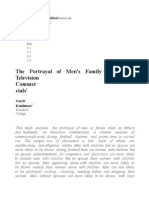Teen Pregnancies in The Philippines
Teen Pregnancies in The Philippines
Uploaded by
monicajoannebalajadiaCopyright:
Available Formats
Teen Pregnancies in The Philippines
Teen Pregnancies in The Philippines
Uploaded by
monicajoannebalajadiaOriginal Title
Copyright
Available Formats
Share this document
Did you find this document useful?
Is this content inappropriate?
Copyright:
Available Formats
Teen Pregnancies in The Philippines
Teen Pregnancies in The Philippines
Uploaded by
monicajoannebalajadiaCopyright:
Available Formats
Teen pregnancies in the Philippines
By Rebecca B. Singson Philippine Daily Inquirer First Posted 19:49:00 06/20/2008 Filed Under: People, Lifestyle & Leisure
MANILA, Philippines?The sexual revolution has ushered in a period in which the average adolescent experiences tremendous pressures to have sexual experiences of all kinds. Filipino teens get a higher exposure to sex from the Internet, magazines, TV shows, movies and other media than decades ago, yet without any corresponding increase in information on how to handle the input. So kids are pretty much left to other kids for opinions and value formation when it comes to sex. Sexual misinformation is therefore equally shared in the group. Parents at home and teachers in school feel equally inadequate or uneasy to discuss the topic of sex with youngsters. The problem mounts because the barkada (gang) has a more profound influence than parents do and they exert pressure and expect the adolescent to conform to the rest of them. In fact, female adolescents whose friends engage in sexual behavior were found to be more likely to do the same compared to those who do not associate with such peers. If the teen perceives her peers to look negatively at premarital sex, she was more likely to start sex at a later age. Numbers Statistics in the United States show that each year, almost 1 million teenage women?10 percent of all women aged 15-19 and 19 percent of those who have had sexual intercourse?become pregnant and one-fourth of teenage mothers have a second child within two years of their first. In the Philippines, according to the 2002 Young Adult Fertility and Sexuality Study by the University of the Philippines Population Institute (Uppi) and the Demographic Research and Development Foundation, 26 percent of our Filipino youth nationwide from ages 15 to 25 admitted to having a premarital sex experience. What?s worse is that 38 percent of our youth are already in a live-in arrangement. The 1998 National Demographic and Health Survey (NDHS) reveals that 3.6 million of our teenagers (that?s a whopping 5.2 percent of our population!) got pregnant. In 92 percent of these teens, the pregnancy was unplanned, and the majority, 78 percent, did not even use contraceptives the first time they had sex. Many of the youth are clueless that even on a single intercourse, they could wind up pregnant. Risks There are many reasons teen pregnancies should be avoided. Here?s a low down on the facts: ? Risk for malnutrition Teenage mothers tend to have poor eating habits and are less likely to take recommended daily multivitamins to maintain adequate nutrition during pregnancy. They are also more likely to smoke, drink or take drugs during pregnancy, which can cause health problems for the baby. ? Risk for inadequate prenatal care Teenage mothers are less likely to seek regular prenatal care which is essential for monitoring the growth of the fetus; keeping the mother?s weight in check; and advising the mother on nutrition and how she should take care of herself to ensure a healthy pregnancy. According to the American Medical Association, babies born to women who do not have regular prenatal care are 4 times more likely to die before the age of 1 year. ? Risk for abortion
Unplanned pregnancies lead to a higher rate of abortions. In the United States, nearly 4 in 10 teen pregnancies (excluding those ending in miscarriages) are terminated by abortion. There were about 274,000 abortions among teens in 1996. In the Philippines, although abortion is illegal, it would shock you to know that we even have a higher abortion rate (25/1,000 women) compared to the United States where abortion is legal (23/1,000 women). For sure, there are more abortions that happen in our country that are not even reported. Backdoor abortions are resorted to with untrained ?hilots? with questionable sterility procedures, increasing the possibility for tetanus poisoning and other complications. ? Risk for fetal deaths Statistics of the Department of Health show that fetal deaths are more likely to happen to young mothers, and that babies born by them are likely to have low birth weight. ? Risk for acquiring cervical cancer The Human Papillomavirus (HPV) is a sexually-transmitted, wart-forming virus that has been implicated in causing cancer of the cervix. This is the most common cancer in women secondary to breast cancer. Women who are at increased risk for acquiring this are those who engage in sex before 18, have a pregnancy at or younger than 18, or have had at least 5 sexual partners, or have had a partner with at least 5 sexual partners. If you start sex at an early age, you have a higher likelihood of going through several sexual partners before you settle down, thus increasing your exposure to acquiring the virus and acquiring cervical cancer. The men can get genital warts from this virus and can certainly pass it on to their partners, thus increasing her risk for cervical cancer. Is that something you would want to gift to your wife with on your honeymoon? There is a way to test women (HPV Digene test) but no test for the man so you can?t know if you have it. Using the condom does not confer protection against acquiring this virus since the condom cannot cover the testes where the warts can grow and proliferate.
Teen mothers are more disadvantaged, on average, than their same-age counterparts. Teenage pregnancies are often associated with an increased rate of delinquent behaviors including alcohol and substance abuse. To begin with, majority of them belong to the low income group. Teenage births are associated with lower annual income for the mother, 80 percent of whom eventually rely on welfare. In the United States, seven in 10 teen mothers complete high school, but they are less likely to go to college when compared to women who delay childbearing. They are also more likely to drop out of school with only about one-third able to obtain a high school diploma. With early termination of formal education comes limited employment opportunities. However, they have the responsibility of having to fend for their children before they even ever planned to. In hiring, an employer may lean toward someone without a child versus someone who is already with one just because there are more chances of absences with the latter when her child becomes sick. They also face greater financial difficulties and marital conflict. With a lower capacity for earning and less emotional maturity, relationships are under more stress for breaking. Young unmarried mothers also face social stigmas that can have harmful psychological and social impact. ? Risk for the baby
Children of teen moms also face negative health, cognitive, and behavioral outcomes. This may result from lack of maturity, and emotional quotient or simply from ignorance due to a lack of life?s experiences. Children born to teenage mothers are less likely to receive proper nutrition, health care, and cognitive and social stimulation. As a result, they may have an underdeveloped intellect and attain lower academic achievement. Children born to teenage mothers are at greater risk for abuse and neglect. Boys born to teenage mothers are 13 percent more likely to be incarcerated whereas girls born to teenage mothers are 22 percent more likely to become teenage mothers. How to prevent teen pregnancy? 1. Keep them at home with an intact family set up. The social institutions surrounding the youth jointly form a web of influence that either shield or lay them open to the lure of sexual risk-taking. The family is one such social institution since an intact family with both parents raising the child was found to be correlated to less risk taking behavior by teens. Those who left home early or were raised by separated parents were noted to engage in sex early and other risk taking behaviors. Family supervision and a stable parental union are associated with lesser chances of their children engaging in premarital sex. 2. Keep them in school. The other social institution that shields the youth from engaging in risk taking behavior is the school. Teens leaving school at an early age are more likely than other group of women to have their first sexual experience outside of marriage. 3. Keep talking to them. Increased parental communication decreases the likelihood of young Filipinos to engage in sexual risk-taking activities. It has been found that the mother, in particular, has a special role because their monitoring as well as open communication lines with their daughter were found to be associated with less chance for the teen to engage in intercourse or have fewer sexual partners. 4. Keep them morally and spiritually grounded. Over 80 percent of the 502 teens in a September poll told researchers that religion is important in their lives. Regardless of gender or race, survey results revealed that teens who attend religious services frequently are less likely to have permissive attitudes about sex. Orienting them with the proper values early helps them imbibe it in their lives and keeps them from succumbing to peer pressure. Preventing teen pregnancies requires a concerted effort on the part of the parents, the school and government. They need to insure that the right information is transmitted to children especially during their pre-teen years and that they are well-monitored and supported emotionally and psychologically. We can?t watch what our kids do all the time, but then again, we won?t have to if they are equipped to make better decisions for themselves.
You might also like
- Cambridge - More! 3 Teacher - S BookDocument117 pagesCambridge - More! 3 Teacher - S BookNguyễn Ngọc Mai100% (3)
- Entp PersonalityDocument15 pagesEntp PersonalityLoved by GodNo ratings yet
- NCPAG Student Government ConstitutionDocument16 pagesNCPAG Student Government ConstitutionJules Guiang100% (1)
- Chapter2 - Review of Related LiteratureDocument13 pagesChapter2 - Review of Related LiteratureDiana Laura Lei57% (7)
- Parenting The Modern Teen - CompressedDocument97 pagesParenting The Modern Teen - Compressedmanja.mitic100% (3)
- Social Issues and Threats Affecting Filipino FamiliesDocument24 pagesSocial Issues and Threats Affecting Filipino FamiliesKarlo Jayson AbilaNo ratings yet
- Tagapan Cicl PDFDocument255 pagesTagapan Cicl PDFMasacal Suhaib MosaNo ratings yet
- Residency PatternsDocument9 pagesResidency PatternsJay Jay BautistaNo ratings yet
- Teenage Pregnancy As A Public Health Issue in The PhilippinesDocument32 pagesTeenage Pregnancy As A Public Health Issue in The PhilippinesAnonymous o77kNsD1No ratings yet
- Project Proposal: Barangay Gibraltar Office of The Punong BarangayDocument1 pageProject Proposal: Barangay Gibraltar Office of The Punong BarangayAida Potacag BuasenNo ratings yet
- Local Nutrition Action Plan (LNAP)Document18 pagesLocal Nutrition Action Plan (LNAP)Jeffrey ReyesNo ratings yet
- General Orientation On RA 9165Document1 pageGeneral Orientation On RA 9165potaot100% (4)
- Social Problems of The PhilippinesDocument5 pagesSocial Problems of The PhilippinesCarlaLuisaVillaluna100% (1)
- 1 Rights of The ChildDocument27 pages1 Rights of The ChildMirasol Elcamel100% (1)
- The Filipino CultureDocument10 pagesThe Filipino CultureJoana VictoriaNo ratings yet
- AOP 2024 Buenavista QuezonDocument270 pagesAOP 2024 Buenavista QuezonChristian Lawrence ReyesNo ratings yet
- Legal SeparationDocument4 pagesLegal SeparationsherwinNo ratings yet
- The Finale2Document17 pagesThe Finale2메리 위100% (1)
- Community Health Practice: Narrative ReportDocument49 pagesCommunity Health Practice: Narrative ReportVivi Hernandez OlavarioNo ratings yet
- Application Drugtesting For 2014Document4 pagesApplication Drugtesting For 2014Xyzka AlvarezNo ratings yet
- Article Iv CitizenshipDocument4 pagesArticle Iv CitizenshipClarissa Ü BurroNo ratings yet
- Benefits and Privileges of Solo ParentsDocument3 pagesBenefits and Privileges of Solo ParentsSterling SamNo ratings yet
- Identify One Policy of The Government On Rural Development and Do A Three-Page Critical Analysis of Its Implementation and Effectiveness. Do This in Narrative Form.Document3 pagesIdentify One Policy of The Government On Rural Development and Do A Three-Page Critical Analysis of Its Implementation and Effectiveness. Do This in Narrative Form.Leslie Ann Marie IsidroNo ratings yet
- Case AnalysisDocument7 pagesCase AnalysisRichelle Anne MillanNo ratings yet
- Reflection Paper On The Alternative View of The Philippine HistoryDocument6 pagesReflection Paper On The Alternative View of The Philippine HistoryChezie Vinna NavaNo ratings yet
- Dinlayan-Lorenzo-ActionPlan Sample Advocacy Community Service Project Plan ProposalDocument27 pagesDinlayan-Lorenzo-ActionPlan Sample Advocacy Community Service Project Plan ProposalRey Ty 郑 文华No ratings yet
- K 12Document104 pagesK 12Mariz Della Arañas83% (6)
- Philippine Underdevelopment in The Light of Dependency TheoryDocument7 pagesPhilippine Underdevelopment in The Light of Dependency TheoryVilpa VillabasNo ratings yet
- Project Profiles 2024 Buenavista MHODocument10 pagesProject Profiles 2024 Buenavista MHOChristian Lawrence ReyesNo ratings yet
- BAGOBODocument3 pagesBAGOBOGerald BastasaNo ratings yet
- Bangsamoro Children in Conflict SituationDocument21 pagesBangsamoro Children in Conflict SituationFauwazNo ratings yet
- President Fidel RamosDocument5 pagesPresident Fidel RamosMaria Lucy MendozaNo ratings yet
- Intro, Background of The Study, Theoretical Framework Semi-Final DraftDocument7 pagesIntro, Background of The Study, Theoretical Framework Semi-Final DraftShye100% (1)
- ThesisDocument19 pagesThesisCI N DYNo ratings yet
- Thesis 1,2 and 3 Community Awareness and Learning EnvironmentDocument31 pagesThesis 1,2 and 3 Community Awareness and Learning Environmentmichael tenajeros50% (2)
- PMSSD 2 Topic 1Document54 pagesPMSSD 2 Topic 1Jonathan CarretasNo ratings yet
- Children's Rights and Responsibilities 2020 - PROCAREDocument6 pagesChildren's Rights and Responsibilities 2020 - PROCAREstanely ndlovu0% (1)
- Final ThesisDocument65 pagesFinal ThesisDenielle PingolNo ratings yet
- A Study About Factors Affecting Interest and Motivation of A StudentDocument6 pagesA Study About Factors Affecting Interest and Motivation of A StudentElla UyNo ratings yet
- ThesisDocument17 pagesThesisArrabella Jane Ocampo OrtuosteNo ratings yet
- Rate of Early PregnancyDocument12 pagesRate of Early PregnancyJondelyn RoyNo ratings yet
- Abstract ThesisDocument13 pagesAbstract Thesisshey100% (1)
- Ap Essay #1Document3 pagesAp Essay #1Josh ShimunoffNo ratings yet
- College of Business and Accountancy: Manuel S. Enverga University FoundationDocument30 pagesCollege of Business and Accountancy: Manuel S. Enverga University FoundationGui EshNo ratings yet
- Factors Affecting The Livelihood of Tenant FarmersDocument20 pagesFactors Affecting The Livelihood of Tenant FarmersGabrielRafaelVillacorteNo ratings yet
- What Is VolunteerismDocument10 pagesWhat Is VolunteerismJuls EdreaNo ratings yet
- Republic Act No 34Document4 pagesRepublic Act No 34anneNo ratings yet
- Chapter 3.2 Natural Reproduction Respects Nature Knowing LovinglyDocument2 pagesChapter 3.2 Natural Reproduction Respects Nature Knowing LovinglyDaniel Martin100% (1)
- 4 Ps SssssssDocument35 pages4 Ps SssssssHappyNeversmilesNo ratings yet
- Research Paper About Poverty - NSTP Project For FINALSDocument5 pagesResearch Paper About Poverty - NSTP Project For FINALSLeoNo ratings yet
- Developmentally Appropriate Practice PaperDocument7 pagesDevelopmentally Appropriate Practice Paperapi-510450270No ratings yet
- Group 9 Final PaperDocument78 pagesGroup 9 Final PaperMyeth EvangelistaNo ratings yet
- Northern Bukidnon Community College: Name: Lofranco, Daniela Elana S. Title: Single Parent Review of Related LiteratureDocument4 pagesNorthern Bukidnon Community College: Name: Lofranco, Daniela Elana S. Title: Single Parent Review of Related LiteratureDaniela LofrancoNo ratings yet
- LETTER of Approval HehehehehehDocument3 pagesLETTER of Approval HehehehehehLeeyan DerNo ratings yet
- Lesson 6 Stages of Moral DevelopmentDocument11 pagesLesson 6 Stages of Moral DevelopmentJameelaNo ratings yet
- Parental Involvement ThesisDocument5 pagesParental Involvement ThesisJelley Durango AbrasadoNo ratings yet
- Chapters 1-5Document74 pagesChapters 1-5Fathrizia PanizaNo ratings yet
- Thesis Single Parent As A NonDocument76 pagesThesis Single Parent As A NonValli Faith Estacion Bibit71% (7)
- Religious Diversity ReflectionDocument1 pageReligious Diversity Reflectionapi-248870978No ratings yet
- Resume & Application LetterDocument3 pagesResume & Application LetterLeslie EstorososNo ratings yet
- The Case for Masks: Science-Based Advice for Living During the Coronavirus PandemicFrom EverandThe Case for Masks: Science-Based Advice for Living During the Coronavirus PandemicNo ratings yet
- Teen Pregnancies in The PhilippinesDocument3 pagesTeen Pregnancies in The PhilippinesMarc Darwin RagojosNo ratings yet
- I.Teenage Pregnancy: It'S Effect On Educational Development of Students and Out-Of-School YouthDocument6 pagesI.Teenage Pregnancy: It'S Effect On Educational Development of Students and Out-Of-School YouthJM LopezNo ratings yet
- Blakemore & Robbins (2012)Document8 pagesBlakemore & Robbins (2012)Renzo LanfrancoNo ratings yet
- Lesson 5 - Activity Sheet 5 EngDocument1 pageLesson 5 - Activity Sheet 5 EngCherrielyn Dela CruzNo ratings yet
- 26-Article Text-112-1-10-20160920Document15 pages26-Article Text-112-1-10-20160920Angel Florence V. VillareNo ratings yet
- Attachment and Development: A Perspective, Longitudinal Study From Birth and AdulthoodDocument19 pagesAttachment and Development: A Perspective, Longitudinal Study From Birth and Adulthooddelfinius65100% (1)
- Char Ed Toolkit PDFDocument672 pagesChar Ed Toolkit PDFPriscilla Ruiz100% (1)
- Research ProposalDocument13 pagesResearch ProposalUsman AliNo ratings yet
- Fulltext01 LibreDocument65 pagesFulltext01 Librepoyskieee28No ratings yet
- Psychosocial PaperDocument14 pagesPsychosocial PaperMary Florence BaltazarNo ratings yet
- The Portrayal of Men's Family Roles in Television CommercialsDocument24 pagesThe Portrayal of Men's Family Roles in Television CommercialseqsgNo ratings yet
- CHAPTER 2 Update 2Document4 pagesCHAPTER 2 Update 2yana suriaNo ratings yet
- RRL EnglishDocument7 pagesRRL Englishadam_barrettoNo ratings yet
- The Challenges of Middle and Late Adolescence: at The End of This Module, You Will Be Able ToDocument8 pagesThe Challenges of Middle and Late Adolescence: at The End of This Module, You Will Be Able ToVilyesa LjAnNo ratings yet
- Per Dev - Gr11 - 2nd Q - Module 5 Family Legacies and Atrributes FinalDocument32 pagesPer Dev - Gr11 - 2nd Q - Module 5 Family Legacies and Atrributes Finalchrismiano222No ratings yet
- Crime and Juvenile DelinquencyDocument12 pagesCrime and Juvenile DelinquencyFelicity DimakulanganNo ratings yet
- WHHW Grade 11 SCDocument20 pagesWHHW Grade 11 SCssssNo ratings yet
- Co Mai Phuong 12: A. B. C. D. A. B. C. D. A. B. C. D. A. B. C. DDocument9 pagesCo Mai Phuong 12: A. B. C. D. A. B. C. D. A. B. C. D. A. B. C. Dkiên ngô100% (1)
- Assertiveness ActivityDocument8 pagesAssertiveness ActivityAqeela AzharNo ratings yet
- MRKTG Fabia Roseller Gotos Abm-2Document10 pagesMRKTG Fabia Roseller Gotos Abm-2Roseller FabiaNo ratings yet
- Hasibul Hasan (211-11-1229)Document4 pagesHasibul Hasan (211-11-1229)Ariyan ShantoNo ratings yet
- Resistance To SpeakingDocument3 pagesResistance To SpeakingMario Laranjo JuniorNo ratings yet
- Theories of GrowthDocument33 pagesTheories of GrowthMaitreye PriyadarshiniNo ratings yet
- Jesus Collantes - Disciplines and Ideas in The Applied Social SciencesDocument16 pagesJesus Collantes - Disciplines and Ideas in The Applied Social SciencesJesus CollantesNo ratings yet
- Bộ Đề Thi Thử Tiếng Anh 2022 PDFDocument138 pagesBộ Đề Thi Thử Tiếng Anh 2022 PDFTrinh TrầmNo ratings yet
- The Causes of Absences and DropDocument28 pagesThe Causes of Absences and Dropchristine100% (2)
- Television by Roald DahlDocument3 pagesTelevision by Roald DahlAimee JohnsNo ratings yet
- Depression ResearchDocument12 pagesDepression ResearchIsaiah Diunne Magat Semilla50% (2)
- Physical and Social Effects of Internet Use in ChildrenDocument6 pagesPhysical and Social Effects of Internet Use in ChildrenHarukaNiLauNo ratings yet

























































































